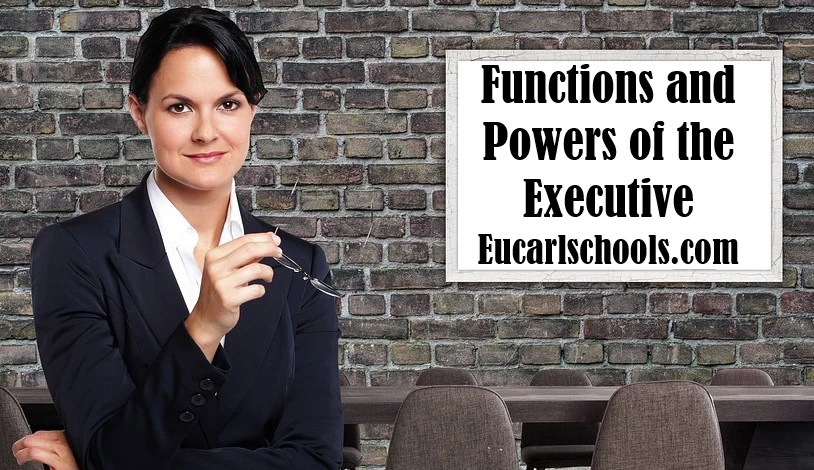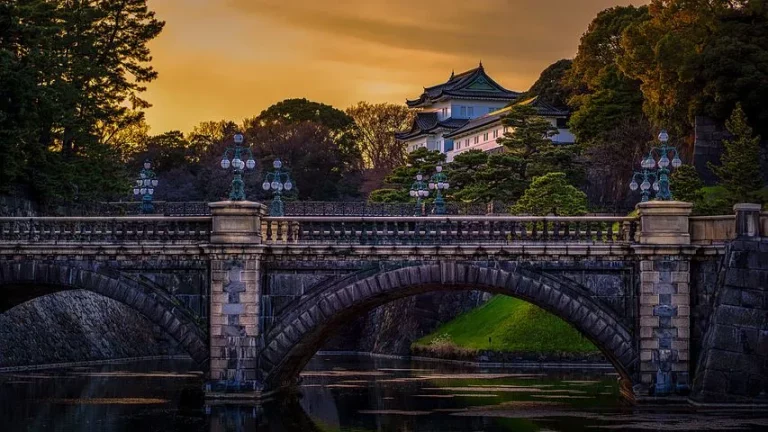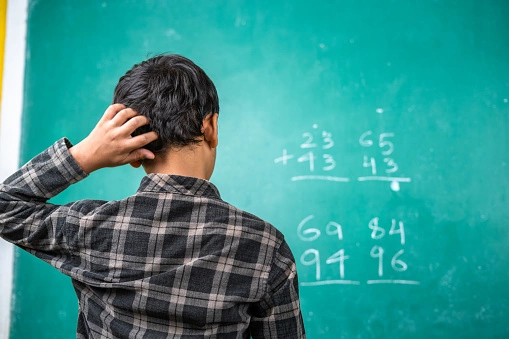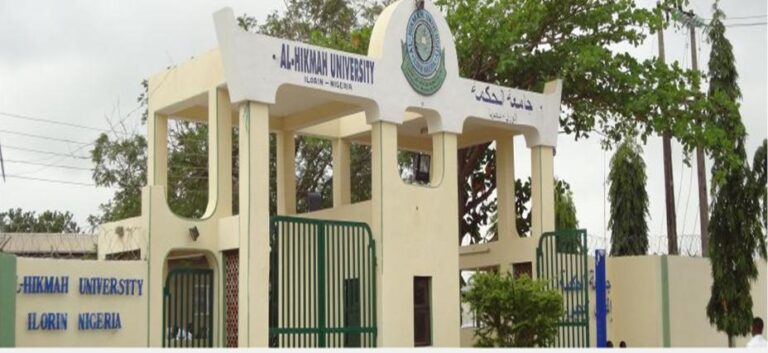Functions and Powers of the Executive
Before we begin at the functions and powers of the executive, Let’s understand the term called government. The government is a constitutionally recognized body saddled with the responsibilities of the overall welfare of the State.
The government achieves this through three means which are known as the arms of government which include: the executive, legislative and judiciary. In this article, we would be singling out the executive and talking about the functions and powers of the executive.
Functions and Powers of the Executive

Enforcement of Laws
The primary functions and powers of the executive are to implement laws asides from the laws firms in Nigeria and thereafter see to the obedience of these laws enacted. Whenever there is a contravention of any law, it is the responsibility of the executive to swing into action ensuring the perpetrators are dealt with accordingly.
Each department in the executive is responsible for the implementation of every law. In every state, the executive is charged with the organisation and Maintainance of the system to ensure there is an implementation of these laws.
Appointment of Functionaries
Every major appointment is made and approved by the chief executive who doubles as the president. For instance, the President of Nigeria in his wisdom after several consultations appoints those who are fittingly qualified to serve in any of the governmental ministries.
The ministers appointed could include the Minister of Justice or Attorney General, Minister of Foreign Affairs, Minister of Works, Minister of Defence, Minister of Education, Minister of State and many others. In the same manner, the President of the United States, who also is the chief executive officer in the United States also makes quite a number of crucial appointments.
All the secretaries who head various government departments, Judges of the Supreme Court and other Federal Courts, the Federal officials in the States etc., are appointed by the US President. However, every one of these appointments is subject to the approval of the US Senate. The aforementioned responsibilities are the functions and powers of the executive.
Treaty-Making Functions
It is well within the functions and powers of the executive in any nation to decide which pacts with other countries are to be signed. The executive does this by carefully and meticulously conducting talks to reach an agreement on matters of the state within the provisions of the international law and also local laws of the state.
The treaty made is then signed by a member of the executive. It must be said that many of these treaties still require verification by the legislature of that particular State. Also, it is the responsibility of the executive to ensure legislative approval for the treaties signed by it.
Peace, Defence and War
One out of the many functions and powers of the executive is to defend and uphold the harmony and integrity of the country and guard it in the instance of an external tumult of war. This, therefore, is where the executive powers are called to action.
It is within the functions and powers of the executive to give orders to organise the military for the defence of the state against external aggressors or in the event of war, to fight if need be. And at other times, negotiating or holding peace talks may be what the executive would have to do.
The executive, therefore, remains the final arbiter of what degree the threat is up against. Have you wondered why the chief executive is addressed as the commander of the armed forces, it is contingent on this particular executive function?
Making of Foreign Policies and Maintenance of Diplomatic Relations
In such a time as we are in where global alliances are most needful, it is within the corridors of the functions and powers of the executive government to formulate the foreign policy of the state that would further encourage International relationships. This function of the executive highlights such a crucial responsibility that could make or marks the state.
The executive also formulates the goals of national interest and establishes which are the priorities. It first formulates the foreign policy of the nation and then implements it for securing the defined goals of national interest. It also is the job of the executive to appoint the ambassadors of the state to other states.
Read Also: Top 20 Countries With the Best Education System
General Policy Making
It is very common in recent times that the functions and powers of the executive are initiating policies that could bring social, economic and cultural development to her people. The executive has to propose policies, prepare plans which could be short-term or long-term and thereafter implement them.
These important decisions which are within the functions and powers of the executive can prove invaluable if they are taken properly. Also, It is the executive who embarks on the journey of policy-making and societal planning. These two above-mentioned actions by the executive are critical as it is by these means that the welfare of the state is transformed.
Some Legislative Functions
Law making is primarily the function of the legislature but not entirely. This is so because the executive also plays a role in matters of law-making. However, it must be said that in this area too, the role of the executive has grown by leaps and bounds.
In a parliamentary system of government, the ministers which are appointed by the chief executive are also members of the legislature and play a leading role in law-making. Also, the fact that the Head of State who is the chief executive has to sign the bills promulgated by the legislature highlights the legislative function of the first executive.
Financial Responsibilities
It is the legislature which is the custodian of all finances. It has the power to impose, reduce or eliminate a tax. Albeit, in actual practice, the executive does undertake a number of financial functions. The executive is saddled with the responsibility of preparing the budget.
The executive recommends the levy of new taxes or alternatively alters in tax structure and administration. The executive also has within its power to collect and spend the money appropriately as ratified by the legislature. The executive even decides the routes and means through which the money is to be collected and spent.
The executive further formulates every economic policy and plan in operation in a state. Also, the executive takes suitable steps for regulating the production and distribution of goods, services, cash flow, prices and exports and imports. It must be said that the executive is charged with contracting foreign loans, negotiating foreign aid and maintaining the financial authenticity of the state.
Some Semi-Judicial Functions
The appointment of judges by the executive is regarded as the best method for ensuring the judicial arm remains independent. In almost every democratic system, the chief executive has the power and authority to appoint judges.
Further, the chief executive has the right to grant clemency, reprieve and amnesty to criminals. Under the peculiar system of administrative adjudication, the executive agencies have within their powers the right to hear and adjudicate cases involving certain fields of administrative functionality.
Awarding of Titles and Honours
Another important function and power of the executive are to confer titles and honours to the people in commendation of their meritorious services to the country.
Such persons who have done respectable work in their different spheres of activity which are but are not limited to Art, Science, and Literature are awarded titles by the executive. Even titles and honours are granted by the executive to that defence personnel who demonstrate exemplary courage and devotion to their duty during times of war and even peace.
Even ordinary citizens are bestowed with such honours in recognition of their praiseworthy work for society. All of these decisions in this regard are taken by the executive arm. An example would be the Nigerian National Honours. These are the set of orders and decorations conferred upon Nigerians and friends of Nigeria every year.
This coronation ceremony is usually presided by the executive arm. The Grand Commander of the Order of the Federal Republic and Grand Commander of the Order of Nigeria are habitually respectively bestowed on former holders of the office of President of Nigeria and Vice President of Nigeria even down to the former military heads of state of Nigeria and Chiefs of General Staff. The Officer of the Order of the Niger is yet also another national honour awarded by the chief executive.
On the other hand, the Medal of Honor is the United States of America’s highest and most prestigious personal military decoration that can be awarded to acknowledge the United States of America’s military force members who have differentiated themselves by varying acts of bravery and valour. The Presidential Medal of Freedom is another award bestowed by the chief executive of the United States.

![List of Universities & Courses that Accepts D7 [O’Level Pass] List of Universities & Courses that Accepts D7 [O’Level Pass]](https://eucarlschools.com/wp-content/uploads/2022/03/admision-768x550.png)




